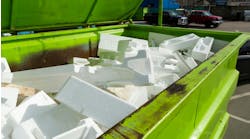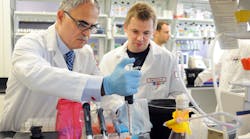Algae Systems LLC, of Daphne, Ala. and IHI Corp. of Tokyo, Japan, announced on August 19 that they have completed demonstration of a new biofuel production approach.
The process is based on the conversion of algae and wastewater to energy and clean water. A demonstration plant, located in Daphne Ala., combines wastewater with algae to produce energy-generating wastewater treatment process, using carbon-negative technologies. This process will yield both bio-fuel and drinking water.
While algae is a component in a number of worldwide experimental production strategies, this approach will differ, according to the companies, by using a system that can apply a variety of algae types to production, adding value by treating wastewater, and producing a drop-in fuel solution using hydrothermal liquefaction to produce fuels that do not need to be blended.
The Daphne approach takes local strains of algae to increase production rates and optimize wastewater treatment opportunities. Most companies in the sector, as well as another IHI subsidiary, IHI NeoG (Kawasaki, Representative Tomohiro Fujita) use proprietary strains of algae that have high lipid outputs and need special attention. At Daphne, the approach is focused on a systems approach. Floating membrane photobioreactors accept wastewater from a local community municipal wastewater utility, drawing nutrients from the wastewater to promote algae growth. The algae consume nutrients in the wastewater, reducing the cost of treating wastewater. In this approach, municipal wastewater becomes an asset to produce energy, rather than a commodity to be expensively processed. Photosynthesis— a gift from the Sun— acts to create the chemical reactions that can power our future.
Use of Offshore Photobioreactors Help Lower Amount of Land Use Needed
The use of offshore photobioreactors means that a valuable land footprint would not be required to deploy the system commercially, and the motion of waves and wind provides ideal temperature and mixing controls as well as a reduction of operating costs. From an environmental perspective, ecological dead zones can also be eliminated.
This demonstration plant is just one of a few algae plants throughout the world and will be the first of its kind to create a carbon negative fuel by treating wastewater. Another feature of the demonstration facility is significant advancements made in the production of fuels from biomass.
Algae Systems has demonstrated a new proprietary technology for the conversion of wet algae and other biomass feedstocks into bio-crude oil, and has successfully demonstrated upgrading the bio-crude oil into diesel, jet and gasoline.
The US Department of Energy recently announced that a research consortium coordinated by Algae Systems and led by SRI International will receive $3.2M in grant funding in 2014 to advance this hydrothermal liquefaction process.











